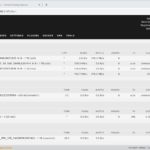If you’re looking to step up from gigabit performance across a small network or node, you’d be hard-pressed to find a better solution than Engenius’s managed 10/2.5GbE ECS2512 switch. It’s available in a $750 PoE version that I tested, as well as a $500 non-PoE version which is ballpark affordable for home users. Throw in portal-based cloud management and you’ve got yourself one heck of an upgrade.
Design and Specs
The ECS2513 is a single-space rack-mountable unit that’s 13 inches wide. The relatively narrow profile allows a fair amount of side clearance in 19/23-inch racks for air flow (adapters are included). The power supply is internal and it uses a standard three prong power cord.
The switch features four gigabit/10GbE SPF+ ports (multi-gig isn’t supported on these except via SFP+ adapters), plus eight 10/100/gigbit/2.5GbE RJ45 ports and one RJ45 console port (for administration). More specs are available here.

2.5/10GbE and PoE generate quite a bit of heat and the PoE model (ECS2512FP) I tested sports a rather loud fan. For light usage scenarios (like my office) or racks with plenty of cooling, a fan control to reduce noise would be nice. My media contact assured me the non-PoE unit is significantly quieter, however, I can’t personally vouch for that.
Management and Cloud
It would take several articles to describe all the ECS2512’s features, but if it’s been done on a managed switch, it’s likely been implemented by Engenius. There’s IPv4, IPv6, DNS and SNMP control; VLAN (Virtual LAN) support including for VoIP; PoE control for the ECS2512FP model; DHCP snooping and relay; LLDP (Link Layer Discovery); port trunking (aggregation); and spanning tree protocol (STP).
Additionally you’ll find security (including DoS); multiple users; access control lists and quality of service settings, as well as monitoring (including port mirroring) and diagnostics. All features may be managed locally, but also via the cloud once you’ve registered the device and added it to the dashboard.

The portal management, shown above, is probably the ECS2512’s coolest trick. Once set up, you can administer the switch from any place with an Internet connection. There are even Android and iOS apps to save you squinting at a tiny browser.
Alas, I’m not a big fan of my networking gear connecting with the world beyond the local area network on its own and US-based Engenius provides no way to turn off that connectivity if there’s a path to the Internet. The company makes switches that are local management only, but none that I saw sporting 2.5GbE.
Note that you can likely circumvent this behavior using a firewall (port 80 and 443 are used). As a matter of fact, my cable modem inadvertently did this, and required a hard reset to restore the ECS2512’s communications with the Web portal. Regardless, external communications should be optional in my book.
Performance
The ECS2513 offers 120 total Gbps of switching capability, or twice as much as the total 60Gbps rating of the ports. That give you plenty of headroom. There’s also a total power capability of 240W for the ECS2512FP PoE which is 802.3af/at/bt PoE++ capable on all ports. I powered a couple of Wi-Fi hotspots and Web cams with the switch and all was hunky-dory.
The 2.5GbE and 10GbE ports performed on par. I saw around 300Mbps per port for the multi-gig, and anywhere from 650MBps to 950MBps depending on the target using 10GbE.
Good Stuff
The ECS2512 is a pro-level switch with pro features, but its price makes it attractive to small houses of any ilk. Believe me, if you’ve had complaints from users about gigabit speeds, 2.5GbE will quiet them without the hassle or cost of 10GbE. The performance increase is noticeable, even subjectively.
If hard-wired cloud management is something you want and feel comfortable with, consider this review two thumbs up. Personally, the lack of an option to disable outside communications is a non-starter for me.










